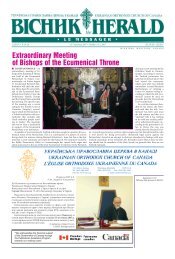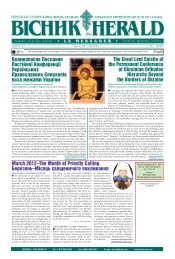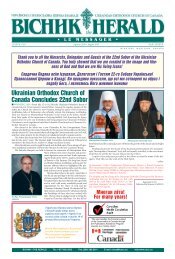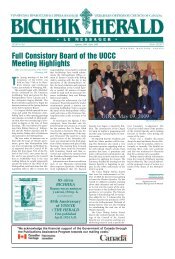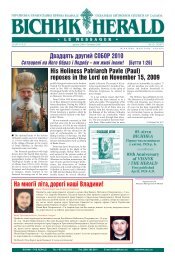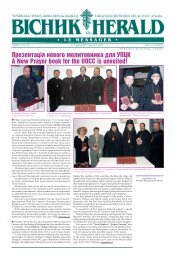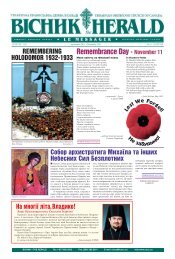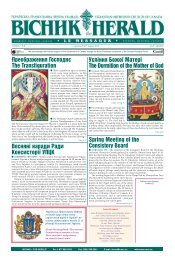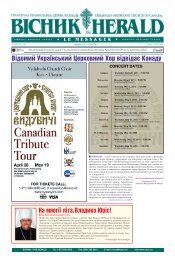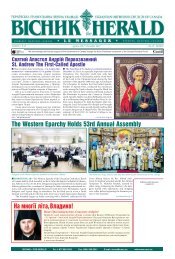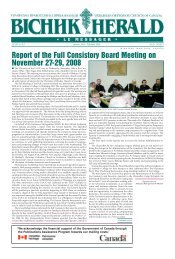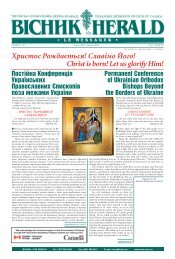Herald June 1_15 07.qxd - Ukrainian Orthodox Church of Canada
Herald June 1_15 07.qxd - Ukrainian Orthodox Church of Canada
Herald June 1_15 07.qxd - Ukrainian Orthodox Church of Canada
Create successful ePaper yourself
Turn your PDF publications into a flip-book with our unique Google optimized e-Paper software.
The View from the Chair4 ВІСНИК1/<strong>15</strong> липня 2007The <strong>Church</strong> I Don't AttendThere's a story told about an older<strong>Ukrainian</strong> man—let's call him"Mykola"—who, while on a cruise,is shipwrecked and finds himselfalone on a deserted island. Being acarpenter by trade, and having nothingbut his tools and a virgin forest athand, he begins constructing a village.He builds houses, stores, a municipalbuilding, etc.After twenty years alone on the islandan exploration party finds Mykola,and the sailors ask him what he'sbeen doing since he was shipwrecked.Mykola takes them to the interior <strong>of</strong>the island and shows them the villagehe's constructed."This is amazing", the captain says."You've got everything—houses, stores,a government <strong>of</strong>fice, everything! But Isee you've built two churches—whytwo?""This one", Mykola says, pointing tothe one on the left, "is my church.""The one over there" he says, pointingto the other side <strong>of</strong> the village, "isthe one I wouldn't be caught dead in!"As the <strong>Ukrainian</strong> saying goes, "there'sno fable without a moral." Not beingstranded on a desert island, it'samazing how much some <strong>of</strong> us, andsome <strong>of</strong> our congregations, resembleMykola.Imagine this: You're in the middle <strong>of</strong>the prairies. There are two small <strong>Orthodox</strong><strong>Church</strong>es, St. Mary's and St.John's, served by the same priest, underthe same bishop, within walking distance<strong>of</strong> the house <strong>of</strong> Mr. A, who's gotanother 5 churches served by the samepriest within easy driving distance. Mr.A only attends services three times ayear, when services are held at St. Mary's."Why?" we ask."Because I belong to St. Mary's", heanswers."But if you were willing to drive toLiturgy as far as you drive to get c<strong>of</strong>feeevery morning you'd be able to attendLiturgy almost every Sunday, not justthree times a year", we observe."No", he says.", only attend servicesin my own <strong>Church</strong>!!!"Or this: It’s a big city. There are 5<strong>Ukrainian</strong> <strong>Orthodox</strong> <strong>Church</strong>es, all <strong>of</strong>them struggling financially and demographically.The opportunity exists tostart a common youth group so thatrather than two children here and ahandful there a critical mass <strong>of</strong> youthcan be gathered in order to have theopportunity to get to know each other,develop friendships, etc. But the idea isdismissed by local parish leadership."We don't want our children hangingout with 'them'", they say, "becausethey're too……" (English, <strong>Ukrainian</strong>,Canadian, pious, secular, you fill in theblank).Or this: young F., who has been veryactive in her parish throughout herhigh school years, goes away to University.Though she is studying in a citywith a large and active <strong>Ukrainian</strong> <strong>Orthodox</strong>community she never onceЦерква, до якої я не ходжуЄжарт про одного старшогоукраїнця—назвемо його Миколою—якийподорожуючи вкруізі потрапив в катастрофуі опинився самотній на безлюдномуострові. Будучи за фахом столяром,потрапивши в ситуацію, де крім молодоголісу і своїх інструментів віннічого не має, Микола почав будуватисело. Він будував хати, крамниці,урядові споруди і тому подібне.Через двацять років острів знайшлидослідники і моряки запиталиМиколу, що він робив увесь цей час.Микола повів їх на середину островаі показав ним збудоване село.Капітан був у захопленні. Він сказав:"ти тут збудував все—хати, магазини,урядові споруди, просто все!Слухай"—каже далі капітан- "я бачу,що ти збудував дві церкви, чому дві?"Микола відповів—ця зліва—це"моя церква". А ось та, показуючи наінший край села,—"це церква, кудимоя нога не ступить!"Стара українська приказка говорить,що "кожна байка має в собі долюправди". І навіть не опиняючисьна безлюдному острові часом деякі знаших парафіян, інколи цілі громадинадзвичайно нагадують Миколу.Уявіть собі: ви на преріях. Неподалікзбудовані дві невеличкі православніцерковці, Пресвятої Богородиціі Святого Іоанна, обидві тієї самоїюрисдикції і їх обслуговує одині той самий священик. Обидві церквизнаходяться на відстані декількоххвилин ходьби від помешканняпана А, так само інші 5 церков, якіобслуговує все той таки самий священик,але трішки дальше, ну скажімо,<strong>15</strong> хвилин їзди від пана А. Аленезважаючи на це все пан А ходитьдо церкви всього тільки три рази нарік, коли богослужения служиться ухрамі Пресвятої Богородиці.Виникає цілком природне запитання:"Чому"? На яке пан А не задумуючисьвідповідає: "Це моя церква".Давайте поглянемо на слідуючийаргумент, якби пан А мав бажанняпроїхати не дальше ніж він кожногоранку їздить до ресторану на каву,він міг би вчащати на Літургію нетри рази на рік, а майже кожної неділі.Але ж він каже: "Ні, я ходжу наслужбу виключно до "моєї церкви"".Але буває і по-іншому: велике місто.5 українських православних парафій,кожна з них бореться за існуванняяк фінансово, так і демографічно.З'являється можливість розпочатиспільний гурток для молоді,який міг би об'єднати двоє дітей зоднієї парафії і декілька з іншої водну динамічну, дружню групу молоді.Але ідея відкидається парафіяльнимпроводом. "Ми не хочемо,щоб наші діти водилися із ними"—кажуть вони—"тому що вони....."(заанглізовані, заукраїнізовані, заканадизовані,засмеренні, засвітськіі т. д.)Або таке. Молода дівчина, яка буладуже активна у парафіяльномужитті своєї домашньої церковноїгромади під час навчання в школі,їде на навчання до університету. Іхоч вона навчається в університеті,який розташований у місті, де є великаі активна українська православнаспільнота, вона ні разу за 4роки навчання не переступила порігthroughout her 4 years <strong>of</strong> study darkensthe door <strong>of</strong> the <strong>Church</strong> there. Whenasked why she says "This isn't my<strong>Church</strong>. My church is back home."The examples are endless. The commonattitude manifested in all <strong>of</strong> themis one <strong>of</strong> unhealthy, unchristian Congregationalism.Theologically it's a heresyagainst the doctrine <strong>of</strong> the <strong>Church</strong>.At every Liturgy (and if we're pious,every day in our prayers) we say "I believein one, Holy Catholic and Apostolic<strong>Church</strong>". But it seems that for a lot<strong>of</strong> people this is just so much hot air.Besides the theological problemthere's a practical problem which is noless troublesome. In limiting my supportand allegiance to only "my" congregation,I limit my ability to positivelyinfluence the life <strong>of</strong> the <strong>Church</strong>as a whole. This positive influence hastwo concrete manifestations—thematerial and the moral.Materially, if I am attending services<strong>of</strong>ten and (if I belong to a smaller orrural parish) at various congregations Iwill be able to contribute more fullyfrom both my financial resources andmy labour and talents.Morally, just being present at Liturgyis a great support to every congregation.What's one <strong>of</strong> the first things wehear when we ask someone "how werethings at <strong>Church</strong> today?" "Very nice.Attendance was good". A full <strong>Church</strong>makes everyone feel good—and guestsmake us feel even better.The <strong>Church</strong> is the body <strong>of</strong> ChristІєрейБогдан Гладьо,Голова ПрезидіїКонсисторії УПЦКRev. Fr.Bohdan Hladio,Chair <strong>of</strong> thePresidium <strong>of</strong> theConsistory <strong>of</strong> theUOCC(cf. Rom 12:4,1 Cor. 12:27, 12:13, etc.).In claiming that they "don't belong" toparish A or parish B the person whorefuses to attend services there whenthey easily can is really saying "I don'tcare about the <strong>Church</strong>. I neither feelmyself to be, nor care about being amember <strong>of</strong> the body <strong>of</strong> Christ. I don'tneed to worship. I don't need the sacraments.I don't want the <strong>Orthodox</strong><strong>Church</strong> on God's terms—I'm in it formyself!" Such an attitude spells death:spiritual death for individuals and materialdeath for congregations.We live in a time and in a place whereunhealthy Congregationalism is areal danger. Virtually all <strong>of</strong> our congregationsare struggling in one way oranother. If we fail to realize that we areall in this together, that we truly do belongto one <strong>Church</strong> notwithstandingour own particular linguistic, ethnic,cultural or political inclinations, andthat we need to support and help eachother, we might end up worse <strong>of</strong>f thanMykola. He, after all, had a <strong>Church</strong> hedidn't attend.We, or our children, mightend up wanting to go to <strong>Church</strong>, buthaving no <strong>Church</strong> to attend at all.якоїсь православної церкви. І колиїї запитали чому, відповідь була: "цене є "моя церква", "моя церква "вдома".Можна наводити безліч подібнихприкладів. І один і той самийнездоровий, нехристианський синдромтак званого конгреціоналізмуприсутній у всіх них. З богословськоїточки зору—це єресь проти церковноїдоктрини. Під час кожної Літургії(і якщо ми благочестиві, кожендень в наших молитвах) мипромовляємо "Вірую в єдину, СвятуСоборну і Апостольську Церкву".Але, на жаль, виглядає так, що длябагатьох людей це собі так простобалачка.Крім богословських проблем тутіснує не менш важлива практичнапроблема. Обмежуючи свою підтримкута відданість тільки для "моєїцеркви" я обмежую свою можливістьпозитивно впливати на життяцеркви загалом. Цей позитивнийвплив має два фундаментальні прояви—матеріальнийі моральний.Матеріально, якщо я часто присутнійна богослуженнях (а належудо маленької або сільської церкви)у різних парафіях я отримую нагодубільше жертвувати як фінасово,так і через свою працю та поміч вданій громаді.Морально, вже тільки самоюсвоєю присутністю на Літургії я виявляюпідтримку кожній громаді.Що саме перш за все ми чуємо увідповідь на запитання: "ну як тамбуло сьогодні у церкві?" "Дуже гарно,був повний храм людей". Повнацерква людей додає доброго почуттякожному із нас, а присутністьгостей робить це почуття ще більшособливим.Церква є Тілом Христовим (Рим.12:4, 1 Кор. 12:27, 12:13 і. т. д.). Кажучи,що ми не належимо до цієї чиіншої парафії людина, яка відмовляєтьсявчащати на богослуження,особливо, коли це можна зробитибез особливих труднощів, в дійсностіпросто каже, що я не дбаю зацеркву. Я не відчуваю себе і не дбаючи я є чи ні Членом Тіла Христового.Мені не потрібно богопочитання.Мені не потрібні Таїнства. Меніне потрібна Православна Церква зБожими правилами—мені все цепотрібно виключно заради самогосебе. Таке відношення символізуєтільки одне—смерть: духовну смертьдля цієї особи і фізичну смертьдля цієї парафії.Ми з Вами живемо в той час і втому суспільстві, де такий нездоровийконгреціоналізм є дійсною загрозою.Фактично, всі наші парафіїв той чи інший спосіб боряться засвоє існування. І якщо ми не зрозуміємо,що маємо ті самі проблеми,так як всі ми є членами однієї Церквине забуваючи наші особистіособливості, етнічні, культурні абополітичні вподобання, і що нам необхіднопідтримувати і допомагатиодин одному,—ми опинимось в гіршійситуації, ніж той Микола. Бовін все ж таки мав церкву, порігякої не переступав. Ми, або нашідіти, можемо опинитись в ситуації,коли ми будемо мати бажання сходитидо церкви, але не будемо матицеркви, куди б ми могли піти.





